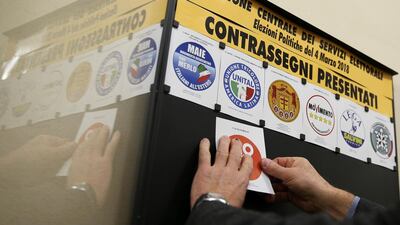With barely a month to go before Italy’s crunch vote, both the 31-year-old leader of the populist 5-Star Movement and the 81-year-old behind the centre-right Forza Italia are seeking to widen their appeal to the mainstream.
A hung parliament remains the most likely outcome of the March 4 general election. However, polls show the anti-establishment 5-Star Movement, led by Luigi Di Maio, is Italy’s single most popular party, while a coalition of right-wing parties around Silvio Berlusconi’s Forza Italia commands the biggest overall share of the vote.
Up until now, 5-Star’s opposition to coalition-building has meant it is considered unlikely to get the first chance to try to form a government.
But on Wednesday, Mr Di Maio seemed to indicate a shift in stance as he reportedly told a group of institutional investors that he would be willing to collaborate with his opponents if the election throws up a political stalemate.
“Di Maio said repeatedly that if he does not have enough seats to govern alone, he saw the likelihood of a government backed by all the main parties, including 5-Star,” a source who attended the meeting in London told Reuters.
Mr Di Maio later denied he would consider post-election alliances with other parties, but said he would negotiate with them on policies.
“I will make a public appeal to all the political parties, asking them to agree on policies and on our government team, without any type of alliances,” he posted on Facebook.
The comments are the latest sign that the party is taking a new direction ahead of the general election.
Founded as a protest movement by bombastic comedian Beppe Grillo in 2009, 5-Star capitalised on widespread distrust of the main parties to become a major political force. But in recent months, Mr Grillo has appeared less and less at party events, while Mr Di Maio – elected in September as the party’s new leader – is seen to represent the moderate wing of the party.
_______________
Read more:
Italy’s Berlusconi seduces voters in final bid for power
Italy prepares for March election with voters gloomy about future prospects
_______________
Mr Di Maio has sought to shed the party’s maverick, populist image, and also reassure foreign capitals that it can be trusted with power. Most recently, he has softened the party’s stance on the euro, saying he sees the possibility of a referendum on the single currency is a “last resort”.
"The fact that Di Maio was in London at all is a sign that things are changing," Luigi Ferrata, public affairs account director at Community Group, told The National. "He's trying to be less radical, a real leader, able to have dialogue with Europe and with senior investors."
Meanwhile, former prime minister Mr Berlusconi has been seeking to reassure voters who are concerned about his party’s alliance with the far-right, anti-EU Northern League, led by Matteo Salvini.
The four-time prime minister is currently appealing against a ban on his standing for office again, following a 2013 conviction for tax fraud. But either way, he is positioning himself as a potential kingmaker who could end up pulling the strings of power after March 4.
His Forza Italia party had been expected to lead a centre-right group of parties into the election, including the Northern League, which takes a tough stance on immigration and has railed against the euro, and the Brothers of Italy, which has links to Italian fascism.
But according to La Repubblica newspaper, Mr Berlusconi met with senior EU leaders last week and assured them that he would form a moderate government which excluded the more extreme fringes.
In meetings with European Commission President Jean-Claude Juncker and Manfred Weber, leader of the European People’s Party group, in Brussels last week, Mr Berlusconi is believed to have categorically declared: "We will not go to government with Salvini.”
The newspaper reported that Mr Berlusconi now expects to couple up with the left-leaning Democratic Party of Matteo Renzi in a broad cross-party coalition, which would also exclude the Five-Star Movement.
“Berlusconi aimed his comments about Salvini to the electorate rather than Juncker,” Mr Ferrata observed. “Juncker is already fully aware that Salvini won’t take office after the election.”
“Parts of the electorate – the conservative, moderate voters – could be scared by the messages of the Northern League,” he continued. “These are the people Berlusconi is trying to appeal to”.
Speaking on Monday, Mr Salvini rejected the reports from La Repubblica as "fake news" and said that he had full confidence in his pact with Mr Berlusconi.
“I trust Berlusconi, I trust the clear agreements and the signed programs,” he said.
However, Mr Ferrata believes that this notion of a “great coalition” between Mr Renzi, Mr Berlusconi and several other smaller parties is the most plausible option after March 4.
“A great coalition is the most likely outcome on the basis of the polls – between the Democratic Party, Forza Italia, some other smaller parties and some Members of Parliament who will leave their party of origin to allow a government to start,” he said.
“Otherwise, we will see a re-run of elections later in the year.”

